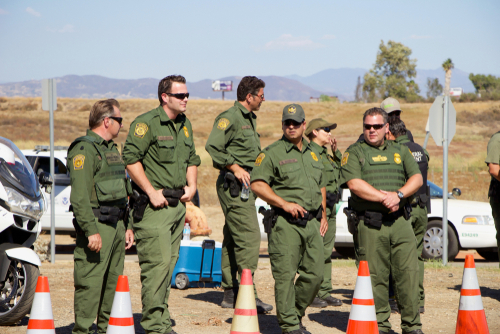The invocation of Article IV, Section 4 of the U.S. Constitution has sparked a fierce national debate. Centered around President Trump’s declaration of a national emergency at the U.S.-Mexico border, this proclamation references constitutional commitments to protect states, challenging interpretations of legal and executive power. How this will impact the federal-state dynamic remains to be seen, but the border security issue adds a new dimension to understanding America’s democratic underpinnings.
The National Emergency Declaration
President Trump declared a national emergency at the U.S.–Mexico border. He cited illegal immigration, drug trafficking, and criminal activity as an ongoing invasion. This move was propelled by concerns over the Federal Government’s obligations to states under Article IV, Section 4, arguing the situation necessitates federal action to prevent an invasion.
The administration claims the rise in illegal immigrants, coupled with criminal activities, threatens public health, safety, and national security. This declaration permits suspending entry for certain immigrants under the Immigration and Nationality Act. The White House’s stance underscores attempts to protect U.S. sovereignty.
EXCLUSIVE: Per Trump admin official, President Trump will sign 11 border related Executive Orders today, including deployment of US troops to the border under NORTHCOM, immediate termination of Biden’s mass parole programs (CBP One cell phone app & CHNV migrant flights) & much…
— Bill Melugin (@BillMelugin_) January 20, 2025
Impact on Immigration Policies
The national emergency allows the U.S. Armed Forces to assist the Department of Homeland Security. Directives involve deterring asylum seekers, necessitating them to remain in Mexico, and advancing the completion of the southern border wall. Other focal points include ending birthright citizenship for children born to noncitizens in the U.S.
“I have determined that the current state of the southern border reveals that the Federal Government has failed in fulfilling this obligation to the States and hereby declare that an invasion is ongoing at the southern border, which requires the Federal Government to take measures to fulfill its obligation to the States” – Trump
In another measure, the administration stopped the CBP One app, impacting how migrants enter the U.S. Further, Mexican drug cartels are designated as foreign terrorist organizations, potentially allowing military interventions in Latin America.
Legal Challenges and Opposition
The American Civil Liberties Union (ACLU) has filed lawsuits against these executive orders, particularly targeting the order to end birthright citizenship. The ACLU argues such measures are unconstitutional and contravene established American values.
Trump’s proposed policies have prompted legal battles, with the ACLU vowing to challenge them. As these disputes unfold, the boundary between state and federal power faces scrutiny. This situation epitomizes broader struggles defining government roles in managing national security.
Sources:
Trump Declares Emergency Over ‘Ongoing Invasion’ at US–Mexico Border | The Epoch Times
Policy Brief: How States Can Secure the Border | The Center for Renewing America

